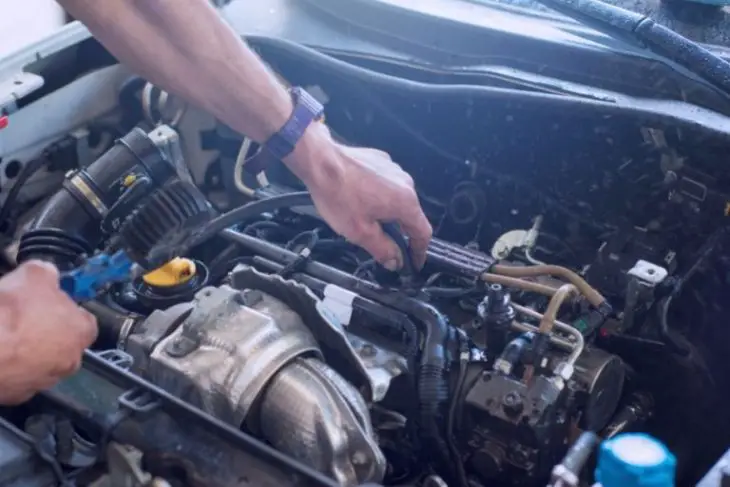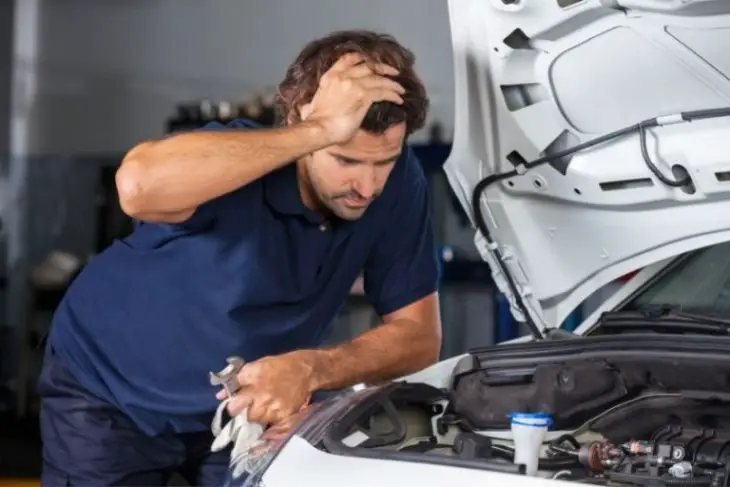When you get into your vehicle and turn on the ignition, you want to hear your vehicle’s engine purring like a kitten. Unfortunately, it may decide to sound like a baby’s rattle, making many different kinds of strange and unsettling noises. Needless to say, this won’t give you much confidence as you prepare to embark on your journey to work, school, a grocery store, or another destination.
While the problem could be somewhat minor, the rattling noises could also be an indication you have a serious mechanical issue that needs to be corrected as soon as possible. If you are wondering why your engine is rattling when you start your vehicle, here are some of the top reasons and what to do so your engine will once again sound smooth.

Table of Contents
Reasons Engine Rattles on Startup
Poor Quality Gasoline
When your engine starts to shake, rattle, and roll upon startup, the problem may be as simple as poor quality gasoline. For your engine to perform at its best, it requires gasoline that has a proper octane rating.
If you are regularly filling your tank with the cheapest and lowest-quality gasoline, this could be causing engine overheating, buildups of carbon deposits inside your engine, and incorrect ignition timing. If you suspect this to be the cause of the rattling, fill up your car with premium gasoline, then drive it around and listen to your engine. If all sounds fine, you’ve solved the problem.
Worn-Out Drive Belt
Upon opening up your vehicle’s hood and looking in and around your engine, you will notice many different belts attached to your engine. One of the most important is the drive belt, which if worn can lead to engine rattling upon startup. Should the drive belt become cracked or start to fray, the rattling sound will be from it flapping around inside your vehicle’s engine bay.
Fortunately, this is an easy and inexpensive repair, whether you do it yourself or choose to have it done by a mechanic. However, while simple and inexpensive, it is also important that the repair be done quickly.
If it’s not, a drive belt that breaks can lead to your alternator, air conditioning, and other vehicle components breaking down as well, taking what was an inexpensive repair and turning it into one that may cost you thousands of dollars.
Low Engine Oil

Along with the gasoline you use to power your car, engine oil can also be the culprit when you hear a rattling sound upon startup. But in this case, it will mean your engine has a very low level of oil and needs to be topped off immediately.
Since the oil in your engine is responsible for lubricating the engine’s many moving parts, not having enough oil to do this leads to engine overheating, parts wearing out much faster, and eventually an engine breakdown.
To prevent a repair that will cost several thousands of dollars and possibly leave your vehicle beyond reasonable repair, turn off your engine and check the oil level if you hear rattling. By examining the dipstick and topping off accordingly, the rattling noises should disappear.
Faulty Starter
When you start your vehicle, it is the starter motor that gets your engine cranking. But inside your starter is a Bendix, which connects the starter to your vehicle engine upon ignition and then disconnects it when you turn off the vehicle.
If the starter’s Bendix is faulty, it won’t properly disengage from the engine, which will have you heard a strange rattling noise. To correct this problem, you’ll probably need the services of a mechanic, unless you are very handy under the hood since the starter motor will need to be replaced.
Slapping Pistons
Yes, you can have slapping pistons inside your engine. While this sounds very precarious, the truth is it’s a relatively minor problem that usually does not result in serious engine damage. If you have a vehicle with very high mileage, this means the engine is getting worn down a bit and may have pistons that fit very loosely within its cylinders.
If so, when you first start up your vehicle, the rattling noise you will initially hear will be the pistons moving around inside their cylinders. But as they expand as the engine warms up, the rattling noise usually goes away.
Timing Belt
Connecting the crankshaft to the camshaft, the timing belt plays a critical role in keeping your engine and its many components on the same page when you are driving. Since most of today’s modern vehicles have overhead cam engines, the timing belts used on these engines are quite long and use hydraulic tension guides to keep the belts taut.
However, eventually, the timing belt will start to wear out, making it harder and harder for the tension guides to keep it in place. When this occurs, a rattling noise will be evident due to insufficient tension on the timing belt. To fix this problem, you’ll need to replace the hydraulic tension guides and maybe the timing belt itself. Don’t put off this repair, since your engine could be destroyed should the timing belt break or slip.
Bad Water Pump
If you haven’t given much thought to your vehicle’s water pump, that rattling sound you are hearing upon startup could be a wake-up call you need to take seriously. Driven by your vehicle’s engine, the water pump is responsible for circulating coolant into the engine and the vehicle’s heating system.
If you hear a rattling sound and start to notice coolant leaks taking place, head to your mechanic to get the water pump drive pulley replaced. This is a much easier and far less costly repair than having a new water pump installed, so don’t delay if this is the problem.
Loose Exhaust System
While you may think the exhaust system starts and stops with your vehicle’s muffler, the fact is the exhaust system starts at your engine and extends to the end of your vehicle at the exhaust pipe. As you add thousands of miles to your vehicle, exhaust system parts like the muffler, catalytic converter, and other parts undergo wear and tear, leading to the loosening of joints within the exhaust system.
When this happens, you’ll begin to hear rattling noises each time you turn on the ignition. In most cases, having a mechanic look things over will lead to simple repairs such as tightening a clamp, replacing a section of pipe that has rusted, or installing a new muffler.
Broken Fan Clutch
A common part in vehicles that are rear-wheel drive, a fan clutch that regulates the cooling fan that is mounted on the engine. If this starts to become defective, you will notice a substantial amount of engine rattling.
If you don’t address the problem as soon as possible, your vehicle will start to experience higher coolant temperatures that may ultimately lead to your engine overheating. Should you need a fan clutch replacement, it is a cheap repair that can be done DIY with little difficulty. But if you’re not comfortable doing so, have a mechanic do it for you in a matter of minutes.
Misaligned Valve Train

While you may have heard of a valve train, you probably don’t know much about how it works. Driven by the camshaft, a valve train opens and closes engine valves, which in turn pushes fuel into engine cylinders and lets exhaust gases escape.
Yet should the valve lifters that let the valves themselves open and close become worn out, stuck, or misaligned, your engine will begin to produce rattling noises, especially when at low RPMs. As for fixing the problem, a simple oil change may do the trick, since dirty oil that is long overdue to be changed can make these valves stick.
Rusted Heat Shield
Though a heat shield sounds like something you’d find Captain Kirk used to protect the starship Enterprise from Klingons, it’s something far less complex and sci-fi than this scenario.
Instead, it’s a thin piece of metal located under your car and near its engine and is there to protect your engine and exhaust system from the higher operating temperatures that have come about due to stricter emissions requirements.
As your car ages, the heat shield may begin to rust, causing it to become loose and rattle each time you start up your vehicle. One of the more common sources of rattling noise associated with engines, it can be easily fixed by any mechanic.
Since your vehicle is so vital to all aspects of your daily life, it is never a good idea to simply ignore engine rattling and hope it goes away. In most cases, ignoring the problem will only mean you’ll be facing a bigger problem later on.
Whether it turns out you only need a basic oil change, a different type of gasoline, or even a new starter or water pump, taking care of the problem now will keep you from having an unpleasant surprise while driving down the road.
Recommended Reading
Common Catalytic Converter Rattles and How to Quiet Them
After having driven your car for hundreds of thousands of miles, you might start noticing some odd symptoms. Maybe the check engine light comes on, you...
Why is My Car Making a Rattling Noise When at Idle?
Whenever you hear your car making a rattling noise when at idle it is always a gamble. A 50/50 chance of either being a simple fix or an expensive replacement.
How Long Will a Wheel Bearing Last After it Starts Making Noise
Vehicles need a good set of tires to keep them performing optimally. But there is more to the wheel than the tire; beyond the visible rubber is an intricate...
10 Best Oil Additives to Quiet Noisy Lifter with Reviews
Looking for the best lifter noise additive for your vehicle? If you’re unsure which additives for noisy lifters is best, then read on!
How to Reduce Road Noise in Car (Soundproofing Car Road Noise)
In this article, we have shared information on How to Reduce Road Noise and How to Soundproof a Car. This includes Car or Automotive Sound Deadening and Soundproofing.
How to Make Your Car Quieter Inside
If you want to be able to hear a pin drop while behind the wheel of your vehicle, here are some of the best ways you can go about making your car quieter inside.